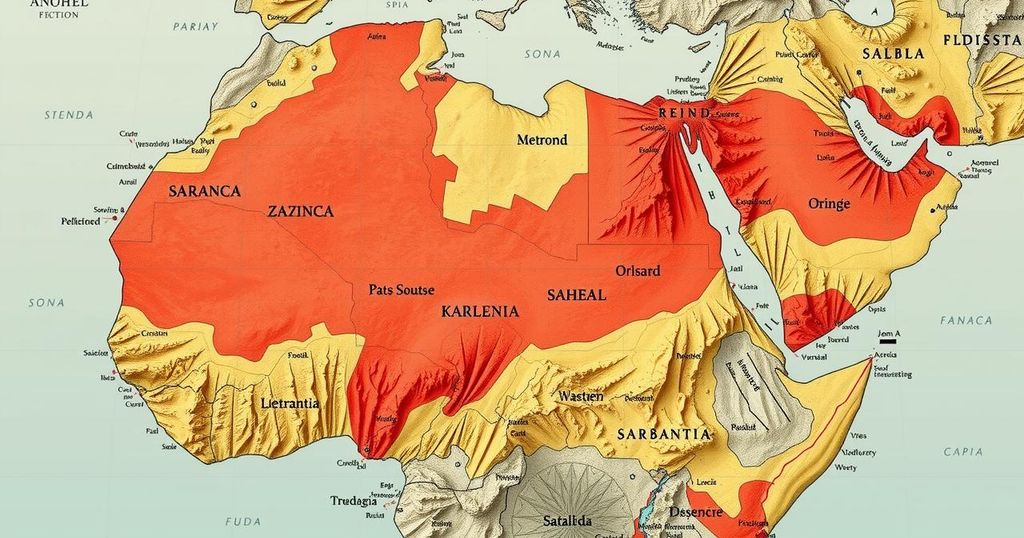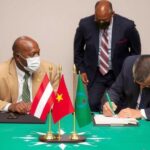Politics
ABD, ABDERAMAN KOULAMALLAH, AFRICA, ASIA, BURKINA FASO, CHAD, CHINA, COUP, DEVELOPMENT, DEVELOPMENT REIMAGINED, DISPATCH, EGUEGU, EUROPE, EUROPE/ASIA, EUROPEAN UNION, FRANCE, ISRAEL, JERUSALEM, MALI, MIDDLE EAST, MIDDLE EAST EYE, MILITARY COUP, MOROCCO, NIGER, NORTH AMERICA, OVIGWE EGUEGU, PALESTINE, PARIS, REGIONAL COOPERATION, REPUBLIC OF CHAD, SAHEL, SECURITY, SENEGAL, TURKEY, UN SECURITY COUNCIL, UNITED STATES, WEST AFRICA
Sophia Klein
Chad and Senegal’s Break with France: A New Era in Sahel Cooperation
Chad and Senegal have ended military ties with France, signaling a shift in relationships as African nations seek greater sovereignty. The move reflects widespread dissatisfaction with French military interventions perceived as ineffective. France’s influence in the Sahel is declining amid rising local leadership and competition from global actors like Russia and China, leading to calls for redefined partnerships based on national priorities.
Chad and Senegal have recently severed military ties with France, signifying a substantial transformation in France’s historical alliances within the Sahel region. Chad’s Foreign Minister Abderaman Koulamallah proclaimed the end of the defense cooperation agreement with France, emphasizing Chad’s sovereignty. Concurrently, Senegal’s President Bassirou Diomaye Faye demanded the removal of French military bases, echoing the sentiment for national independence from former colonial powers. These developments convey a growing trend among African nations to redefine partnerships based on sovereign interests rather than colonial legacies.
The termination of military cooperation is part of a greater decline in France’s influence in the Sahel, which has witnessed widespread dissatisfaction with French-led interventions that have often failed to establish stability. Critics indicate that French military operations have not only perpetuated violence but have also allowed rebel groups to undermine existing governments, resulting in heightened local resentment towards France’s perceived overreach in regional matters.
Historically, France maintained its authority through close ties with regional elites, however, the current political landscape unveils a wave of local leadership and a public eager to challenge French dominance. The recent political turmoil in France, including a collapsed government amid multiple crises, has exacerbated the sense of disconnect between French political decision-making and ground realities in Africa. Furthermore, issues surrounding the CFA franc system emphasize a long-standing financial dependence perceived by countries like Chad and Senegal as remnants of colonialism.
Amid these changes, France’s military strategies are being reevaluated as the nation faces increased competition from emerging global players such as Russia and China, who are providing viable alternatives to the traditional partnerships. The pivot away from France’s military presence in the Sahel towards greater opportunities for self-reliance reflects a broader shift towards a multipolar world order, where African nations seek to establish sovereign solutions to their security and development challenges.
Recent geopolitical shifts in the Sahel reveal a significant modification in France’s relationships with its former colonies as Chad and Senegal pivot towards greater sovereignty by canceling military ties with Paris. Historically, France has exercised substantive influence in the region through various military interventions and security agreements. However, following a series of failed operations leading to increased instability, a campaign for self-determination has emerged among local leaders and populations, further complicated by France’s domestic political upheaval and the evolving international landscape that now includes rival powers offering alternative partnerships. This context sets the stage for a re-examination of France’s traditional role in West Africa, as countries seek more equitable frameworks for diplomacy and military cooperation.
The termination of military agreements between Chad and Senegal and France signifies a crucial turning point in the Sahel’s geopolitical dynamics. As these nations assert their sovereignty and independence from former colonial powers, France faces a declining influence characterized by dissatisfaction with military interventions and financial dependencies. The evolving multipolar world may lead to a substantive reconfiguration of France’s military approach in Africa, as local governments increasingly opt for alternatives that align more closely with their national interests and goals of self-determination.
Original Source: www.middleeasteye.net








Post Comment